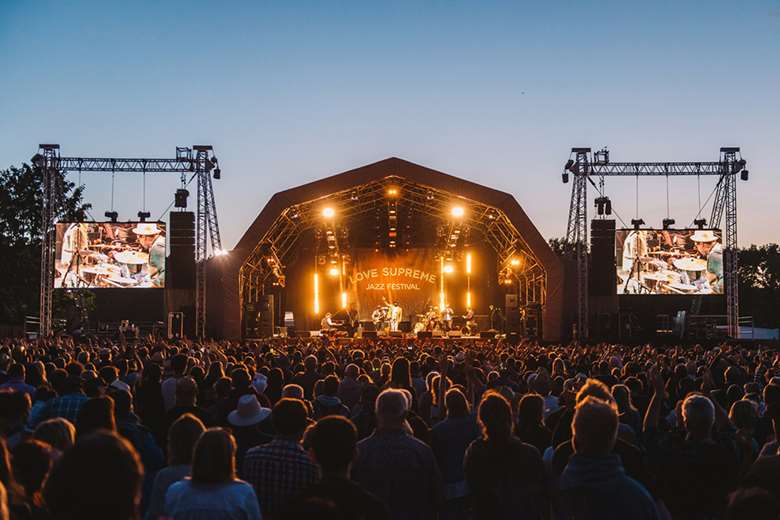First successful recipients of Cultural Recovery Fund announced but freelancers’ futures still under threat
Mike Flynn
Monday, October 12, 2020
Music venues, festivals and music promoters are among those receiving funds to stay afloat through the autumn and winter

There was a bit of good news for music venues and festivals as the first tranche of recipients of the government’s Cultural Recovery Fund were announced. Among those to receive £68.7 million of the £257.4m made available in the first round of the scheme (for applications of £1m and under) were many venues, festivals and organisations that host and promote jazz gigs. These include Bush Hall (£679,603), Islington Assembly Hall (£235,564), Clapham Grand (£300,000), The 100 Club (£491,486), Manchester's Gorilla (£255,500), Village Underground (£398,000), Eat Your Own Ears (£99,066), Portsmouth Guildhall (£215,000), and Camden's Electric Ballroom (£206,974), while the fund also assisted Leeds-based Futuresound Events (£219,368), Generator North East (£145,736), Hackney Empire (£585,064), Hootananny Brixton (£250,000) and Love Supreme Jazz Festival (£118,524) who are among more than 1,300 arts and cultural organisations that have received funding in all. Music Week reported that of the 90 per cent of results now in for the grassroots sector, 89 per cent of applications have been successful.
In addition there were grants for Serious Events (£229,723), Camden Assembly (£250,000), Brighton Dome (£493,000), The Boileroom (£70,000), The Columbo Group (£150,000), Wigmore Hall Trust (£1,000,000), Royal Philharmonic Orchestra (£996,702), Royal Liverpool Philharmonic (£748,000), London Philharmonic Orchestra (£650,000) and London Symphony Orchestra (£846,000), Manchester Jazz Festival (£64,968), Metropolis Music (£231,942), McKeown Events (£185,289), Metropolis Music (£231,942), Middlesbrough Town Hall (£200,997), Slam Dunk (£175,981), Sound Diplomacy (£125,000) and St George's Bristol (£564,916).
Commenting on the funding announcements, the Music Venues Trust CEO Mark Davyd said: “We want to recognise the efforts of the government, particularly the Secretary of State and the Chancellor, to understand what was required by grassroots music venues, develop a solution, and make it happen. This intervention today helps enormously, giving MVT our sector and our communities, an achievable opportunity to complete the English section of the jigsaw. We keenly await results from funding applications in Wales, and of round two of this fund. Our work with the governments of Scotland and Northern Ireland will continue to seek further support for venues there. Our immediate focus now will be to work with every venue that was ineligible for funding, and any venue that was unsuccessful in their application to this fund, to ensure that at the end of this crisis communities right across the country have a thriving and healthy live music scene to return to.”
This initial round of funding comes after the MVT’s dire warnings of the cultural damage that would be caused without financial assistance for a whole range of cultural venues and organisations across England.
While the funding was widely welcomed, Deborah Annetts, CEO of the Incorporated Society of Musicians, added that there are still major concerns for freelancers who in danger of falling through the gaps of eligibility for financial help: “Today’s announcements are insufficient to stimulate a ‘cultural bounceback’. Arts venues and performers need support that makes it financially viable to reopen within social distancing safety requirements. That is why the ISM is campaigning with the Musicians Movement to #MakeMusicWork and calling for the creation of a new Freelance Performers Support Scheme. Containing both a cultural exemption on VAT for tickets and a guaranteed fee for each performer, this proposal puts freelancers at the heart of a sustainable funding model for venues. With musicians' livelihoods on the line, we are calling on the UK government to truly provide a ‘vital boost for the…culture sector’s recovery’ by implementing funding that doesn’t just help the arts survive, but enables them to thrive once again. Until the music sector can fully go back to work, freelancers need a bridging scheme. Therefore, the government should deliver on its pledge to ensure parity between employees and the self-employed by maintaining the existing level of support provided by the Self Employment Income Support Scheme (SEISS) and expanding the eligibility criteria. The UK music industry relies on world-leading talent to make a huge contribution to our economy and global influence, so it is vital that measures are put in place to help freelancers until they can fully return to work."
And as the government announced its new three tier lockdown levels across the country gigs, socially distanced or otherwise, have effectively been banned in areas of England placed under a "high" and "very high" alert level. The Prime Minister announced a new series of tiered local lockdown measures to tackle the Covid-19 pandemic in the House Of Commons today (October 12), and while live music was not mentioned directly, households and support bubbles subject to the strongest two levels of restrictions will no longer be able to mix indoors from Wednesday making gigs impossible.
For more info visit www.ism.org and musicvenuetrust.com